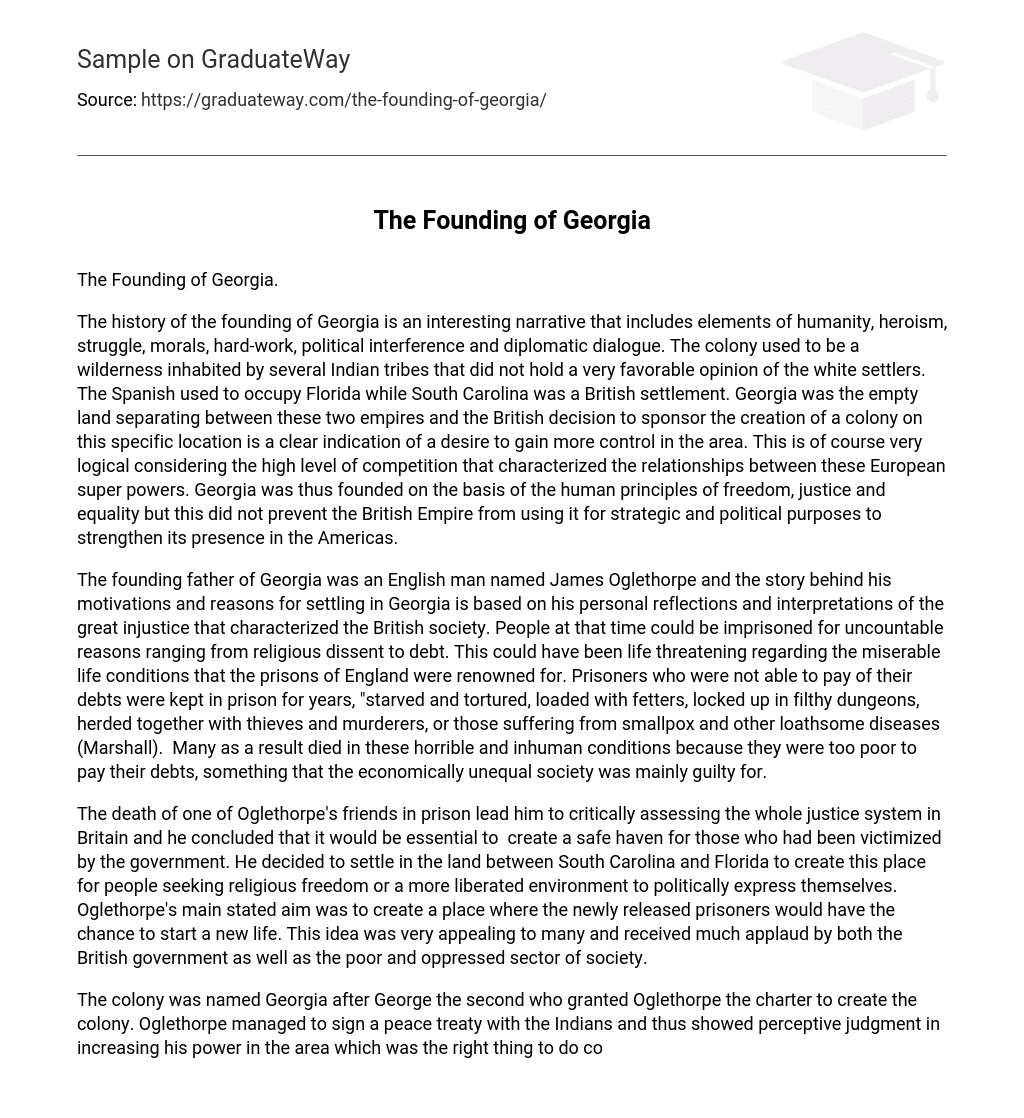The Founding of Georgia.
The history of the founding of Georgia is an interesting narrative that includes elements of humanity, heroism, struggle, morals, hard-work, political interference and diplomatic dialogue. The colony used to be a wilderness inhabited by several Indian tribes that did not hold a very favorable opinion of the white settlers. The Spanish used to occupy Florida while South Carolina was a British settlement. Georgia was the empty land separating between these two empires and the British decision to sponsor the creation of a colony on this specific location is a clear indication of a desire to gain more control in the area. This is of course very logical considering the high level of competition that characterized the relationships between these European super powers. Georgia was thus founded on the basis of the human principles of freedom, justice and equality but this did not prevent the British Empire from using it for strategic and political purposes to strengthen its presence in the Americas.
The founding father of Georgia was an English man named James Oglethorpe and the story behind his motivations and reasons for settling in Georgia is based on his personal reflections and interpretations of the great injustice that characterized the British society. People at that time could be imprisoned for uncountable reasons ranging from religious dissent to debt. This could have been life threatening regarding the miserable life conditions that the prisons of England were renowned for. Prisoners who were not able to pay of their debts were kept in prison for years, “starved and tortured, loaded with fetters, locked up in filthy dungeons, herded together with thieves and murderers, or those suffering from smallpox and other loathsome diseases (Marshall). Many as a result died in these horrible and inhuman conditions because they were too poor to pay their debts, something that the economically unequal society was mainly guilty for.
The death of one of Oglethorpe’s friends in prison lead him to critically assessing the whole justice system in Britain and he concluded that it would be essential to create a safe haven for those who had been victimized by the government. He decided to settle in the land between South Carolina and Florida to create this place for people seeking religious freedom or a more liberated environment to politically express themselves. Oglethorpe’s main stated aim was to create a place where the newly released prisoners would have the chance to start a new life. This idea was very appealing to many and received much applaud by both the British government as well as the poor and oppressed sector of society.
The colony was named Georgia after George the second who granted Oglethorpe the charter to create the colony. Oglethorpe managed to sign a peace treaty with the Indians and thus showed perceptive judgment in increasing his power in the area which was the right thing to do considering the anger his settlement in Georgia triggered in Spanish Florida that consequentially soon attacked the new colony. The British Parliament’s decision to support the colony financially is very significant especially when the fact is considered that Georgia is the only state that has received such an aid. (Marshall) The other colonies were founded on the same principles and dreams of providing a safe harbor for the oppressed segments of society. The question that hence follows is why Georgia received such a special treatment? The answer to this is very simple. It was the perfect pawn against the increase of Spanish influence in the South and was therefore strategically very important to the enhancement of British power in the United States.
Georgia was initially built on the principles of no slavery or alcohol. This however changed after the death of Oglethorpe and the divisions in society were especially marked from then. The tension that grew across America between the slave-owners and non-slave-owners did also take place in Georgia:” The widening gap in wealth and opportunity between slaveholders and non-slaveholders only heightened tensions as the debate over secession grew more heated.”(Cobb Page 20)
The peaceful relationships with the Indians did not continue for a long time. It was Oglethorpe who had stressed the importance of such diplomacy with the natives. But Georgian history includes events like the immense prosperity that the colony witnessed under the growth of the institution of slavery. The history of Georgia also includes the removal of some native Indian tribes from the area. The brutality and cruelty needed for such acts was appalling to eye witnesses:” John G. Burnett, a soldier who served as an interpreter, was a sad witness to what he called “the execution of the most brutal order in the History of American Warfare.” Burnett remembered seeing helpless Cherokees arrested and dragged from their homes and driven at bayonet point into the stockade…..The sufferings of he Cherokees were awful. The trail of the exiles was a trail of death.” (Cobb, Page 12) This painful narrative is in stark contrast with the principles that the colony was founded on that all aimed at creating a more peaceful place for the settlers and the natives to live together in harmony. The greed and corrupt human nature destroyed the idealistic aspect of the colony and rendered it just another place where materialistic pursuit was more important than any human considerations or empathy.
Works Cited.
Marshall, Henrietta Elizabeth. This country of ours; the story of the United States: Chapter 44, The Founding Fathers. New York, George H. Doran Company, 1917. Retrieved on July 29, 2009 from http://digital.library.upenn.edu/women/marshall/country/country-IV-44.html
Cobb, James C. Georgia Odyssey. University of Georgia Press, 2008





